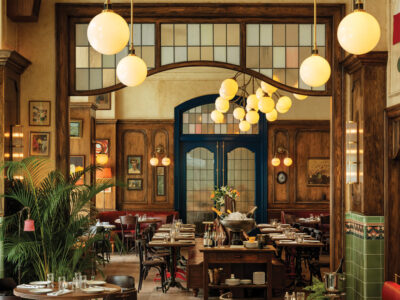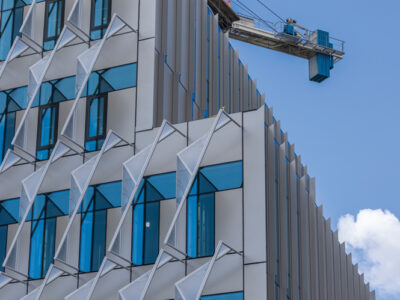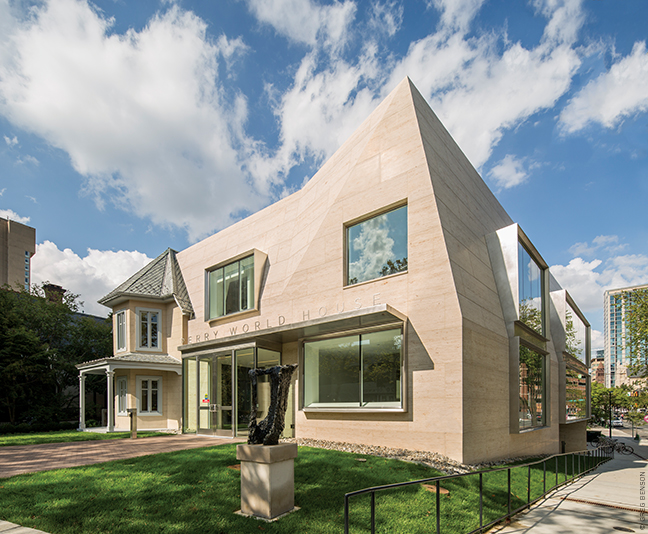
Penn unveils its ambitious global policy center—which, in the run-up to the US presidential election, has wasted no time hosting a Who’s Who in the realm of world affairs.
BY TREY POPP | Photography by Greg Benson
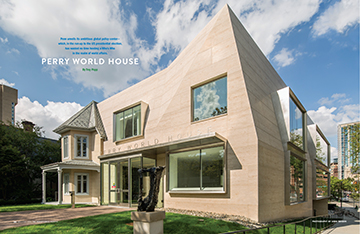
Summer has gotten to be a busier season at Penn in recent years, but late afternoons in July have a way of slowing things to a crawl. Emptied of undergraduates, along with many vacationing professors, some corners of campus get as hot and lonesome as a tumbleweed run. But on July 27, during a pre-primetime lull in the Democratic National Convention across town in Philadelphia, a new University institution found itself hosting a veritable Murderers’ Row of Democratic national security honchos, trailing a national media contingent of proportions rarely seen on the west side of Locust Walk’s 38th Street pedestrian bridge.
The previous day, American intelligence agencies had expressed “high confidence” that the Russian government had been behind the cyber theft of embarrassing emails and documents from the Democratic National Committee, whose release by WikiLeaks was suspiciously timed to coincide with the party’s convention. That morning, Republican presidential candidate Donald Trump W’68 praised Vladimir Putin’s “leadership qualities” at a news conference during which he implored Russia to “find the 30,000 emails that are missing,” in a reference to communications deleted from Hillary Clinton’s email server during her tenure as Secretary of State. As longtime Kremlin observers noted Moscow’s rich history of manipulating foreign elections, American commentators bristled at the boldness of this apparent attack, and roundly lambasted Trump’s cavalier response.
Among them were former US Secretary of State Madeleine Albright and former Defense Secretary and CIA Director Leon Panetta, who kicked off Perry World House’s first marquee event, a panel discussion on national security, by voicing worries about the potentially destabilizing effects America’s presidential election campaign might already be having in Europe and the Middle East.
Before Tom Donilon, a former national security advisor to Barack Obama, jumped in to offer substantive remarks of his own, he took a moment to savor the setting.
“Leon Panetta and I have probably been in—not an exaggeration—500 meetings together over the last seven years,” Donilon said, breaking out into a smile and turning toward the building’s benefactor, University Trustee Richard C. Perry W’77. “We have never been in a place with natural light, though! So Richard, thank you!”
Perry World House, whose soaring public atrium is trimmed in cream-colored limestone and capped by a massive triple-gabled skylight abutting a building-height glass wall, would not formally open for another two months. But Donilon’s gracious comment ratified Penn’s hopes for what this place could be: a “well-lit situation room,” as panel moderator Vikram Singh later dubbed it, where policy practitioners and scholars could come together to probe global challenges and opportunities in an increasingly interconnected world.
At the building’s official grand opening in September, vice provost for global initiatives Ezekiel Emmanuel characterized Penn’s long history of global engagement—whose oldest embodiment is in the Museum of Anthropology and Archaeology—as “haphazard and inconsistent” until quite recently. Perry World House, he said, aims to give “more coherence and centrality to our global activities at Penn.”
As a new fixture on the western part of campus, it cuts an unusual profile in several ways.
“Unlike many other Penn buildings—actually, all of them—Perry World House is not owned by one school or another,” Emanuel said. “It’s a University building with a stated mission to bring the entire University, all 12 schools, together. That is quite unique in the Penn tradition.”

“Blunt Collision”
It is architecturally unique as well. It occupies the former site of Kappa Alpha fraternity—an 1851 brick-and-stucco cottage whose facade was partly retained and incorporated into an unmistakably modern 17,400-square-foot limestone building 10 times the size of the original house. The result combines abstract geometry and postmodern playfulness in what University architect David Hollenberg GAr’76 calls a “blunt collision” between the old and the new.
The cottage, a remnant of the neighborhood’s residential history before Penn’s 1872 relocation to West Philadelphia, was the oldest surviving structure on campus. It originally belonged to a merchant named R. D. Work, according to Perry World House lead architect David Piscuskas, a founding partner of the firm 1100 Architect. Though the diminutive house was not protected by historical-preservation restrictions, and could have been demolished, Penn saw advantages in keeping it—in some form or another. Any new building overlooking 38th Street’s four lanes of traffic would require a scale commensurate to that wide thruway, but the portion facing Locust Walk would need to be “familiar rather than forbidding,” Hollenberg says.
Piscuskas’s design retains the bay-window profile of the original structure, along with its gabled roof—whose asphalt shingles were replaced with Pennsylvania slate, which likely adorned the original. But both the facade and roof were totally rebuilt, and otherwise the cottage survives only as a two-story volume of space (student lounge on the bottom, conference room on the top) that forms one modest, faintly homey corner of an interior otherwise characterized by interconnected volumes of space with sightlines that constantly draw the eye outward through large windows and curtains of glass.
Yet the old house inspired the new structure’s composition. “We kind of simplified the geometry embedded in the cottage,” Piscuskas says. “We didn’t try to compete with it ornamentally. But we did enjoy working through the possibilities of these facets and angles and shapes that, to our mind, are clearly derived from that cottage building—its roof forms and its bay projections.” Those crisp planes and angles are rendered in limestone that matches the scored stucco of the cottage portion—which itself was a “19th-century architectural deception” meant to simulate real stone on the cheap, as Hollenberg puts it.
The taut stone facade reads like an abstracted boulder pierced by crystalline panels of glass—an impression deepened by the building’s floor, which is paved with limestone from the same German quarry, only cut horizontally rather than vertically, exposing cross-sections of fossilized nautilus shells. The walls feature large-scale works of art collected by Richard and Lisa Perry, ranging from a sprawling installation of abstract blue bird-like forms by Patty Udell C’78 to large-scale photographs. The first image that greets visitors in the entry foyer is a six-by-eight-foot photograph of the Korean De-Militarized Zone by Atta Kim, who used an eight-hour exposure that emphasizes the deceptive serenity of that lush landscape, whose 63-year status as a no man’s land has turned it into what has been called an “involuntary nature reserve” with some of the most pristine wildlife habitat in North Asia.
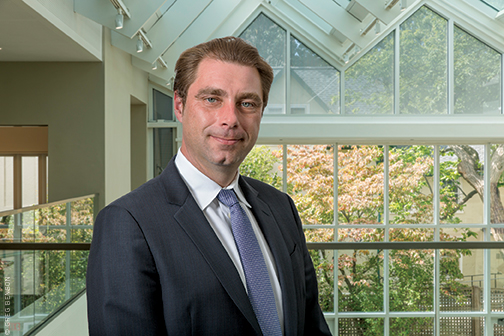
Global Policy Hub
Perry World House has three main programmatic pillars, according to its inaugural director, Penn Law professor William Burke-White.
“One is as a public forum. It’s a place where the University can come together and can connect to the outside world,” he says. “Some of that public forum is stuff that we at Perry World House create. Other times, though, it’s a public forum that others use and that we just facilitate. We have a kind of global policy lab, which is a cool multi-use space. We have a classroom downstairs, and a conference room upstairs that really can support that public forum side of things.”
Even as the art was being installed in September, for instance, the Department of Slavic Languages and Literatures kicked off the first installment of “Europe on the Rocks,” a yearlong series of public symposia co-sponsored by the Penn-Temple European Studies Colloquium and Perry World House. Penn political science professors Julia Gray and Brendan O’Leary were joined by Jonathan Hopkin, of the London School of Economics, to discuss the constitutional and geopolitical ramifications of the Brexit vote. Future offerings will cover Europe’s refugee crisis, the rise of right-wing populism in Europe and the United States, and an attempt to answer the provocative question “Is Russia undermining or saving Europe?”
“The second thing we do is very much student-oriented,” says Burke-White. Twenty-five undergraduate fellows from all four of Penn’s undergraduate schools will attend special seminars every week or two, often featuring visiting scholars and policymakers.
“Unlike at some of our peer schools, where they might have to just do policy, here they get to be an engineer engaged in policy, a nurse engaged in global policy, a political scientist or an economist” engaged in global policy, Burke-White emphasizes. They will also form teams to “take on a real-world policy project for a real-world client,” learning how to conduct research and craft a policy white paper—which is a different beast from an academic thesis.
“We hope that this really gives them the kind of policy experience that if they then want to go get a job at Brookings, or at the Council on Foreign Relations, or at the UN, they’ll be able to say, ‘I did that.’”
The third pillar amounts to a policy research center, where Penn faculty can collaborate with visiting scholars and policy practitioners who will lead faculty-centric seminars, Burke-White says. Perry World House will start out focusing on two themes. The first is “Global Shifts: Urbanization, Migration, and Demography.”
“We’ve got a design school with the leading institute of urban issues in the country,” Burke-White says. “We have the Population Studies Center, linked to the sociology department, that I think people say hands-down is the best in the country … and then we’ve got lawyers who think about asylum rights and refugee rights. We have political scientists who are thinking about the interstate implications of refugee flows and migration. And we have refugee crises all over the world.”
The second research theme will examine “The Future of the Global Order: Technology, Power, and Governance,” which will run the gamut from cybersecurity and drone warfare to “fast-moving financial flows.”
Burke-White “began life as a Russianist,” writing his undergraduate thesis at Harvard on the 1986 Reykjavik Summit between Ronald Reagan and Mikhail Gorbachev, which failed to produce an agreement but broke important ground on the way to subsequent limitations on ballistic missiles. He attended Harvard Law School and holds a doctoral degree in international relations from Cambridge. He joined Penn Law in 2005. From 2009 to 2011, he served in the Obama administration on Secretary of State Hillary Clinton’s policy planning staff.
“The two and a half years I spent in government deeply informed how I look at scholarship,” he says. “My understanding of how international law works is very different after you’ve actually done it.” It also reinforced his interest in “informing policymaking with real academic knowledge, and also helping academics better understand the policy process.
“The two things often pass like ships at night. And if they don’t sync together, the vast array of academic knowledge that could allow us to make better decisions, or create new ideas or find innovative solutions is lost,” he says. “And so figuring out how to sew those two pieces together” is the goal he has set for Perry World House.
Its official grand opening, on September 19 and 20, was jam-packed with global thinkers and doers. They ranged from former Defense Secretary Robert Gates to former UN Commissioner for Human Rights Navi Pillay. Former US Ambassador to China and former Governor of Utah Jon Huntsman C’87 Hon’10 shared the stage with Kurt Campbell, an Obama-era assistant secretary of state for East Asian and Pacific affairs, and Frances Townsend, George W. Bush’s Homeland Security advisor. One panel discussion offered a lively answer to the question: What do you get when you throw an evangelical Baptist reverend and a liberal rabbi onto a stage with a reformed Islamist and a chancellor of the Vatican’s Pontifical Academy of Sciences?
Along with a bevy of Penn deans and center directors, they covered a lot of ground.
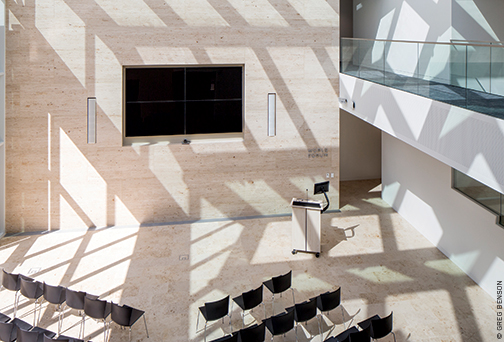
A High-Tech, Post-Border World
“In the last 20 years,” said David Heyman, a former assistant secretary of policy at the Department of Homeland Security, during the opening panel, “we’ve seen more people living and working in countries they were not born in, more capital flows, communications, trade, exchanges between people and businesses than any other time in history. That fluidity—of people, ideas, commerce, capital, finance—is changing the nature of the centerpiece of international affairs, which is the notion of sovereignty … Global flows of all these things have not just become a luxury for economic exchange in the way we lead our lives, but rather a necessity, a working requirement of nation-states for them to thrive and succeed in the world. And as such, nation-states can no longer afford to limit themselves by borders because of this rapid flow that’s essential for their own survival.”
Vijay Kumar, dean of the School of Engineering and Applied Science, explained how this manifests in technology research and entrepreneurship. “In tech innovation, the US is still the world leader. One of the reasons we’re the leader is our policy toward immigration. We attract the best talent in the world. They come to top universities, like Penn, because of the welcoming environment we’ve created. And as long as that continues to happen—and I’m hoping no walls will be built across any borders—I think that will continue.
“But there’s a complementary piece,” he continued, “which is entrepreneurship: creating the ecosystem that takes that innovation and brings it to market. And these two go hand in hand, but now, that second piece doesn’t have to beco-located with the tech-innovation piece. Already you’re seeing this in China. So, five years ago, China was nowhere in the robotics and drones space. Today, they are the undisputed world leaders in drones.” A big reason, he said, is the manufacturing and supply-chain ecosystem China has nurtured. But another factor boils down to competition for engineers and innovators, who frequently complete their educations in the United States only to face the expiration of student visas. “We end up expelling a lot of the people who could contribute to our own economy,” Kumar remarked.
And drones happen to be a prime example of the current speed of technology diffusion—with implications that extend far beyond economic growth.
“Today we live in a world in which 90 countries have drone programs,” said Michael Boyle, a La Salle University professor of political science who is researching a book on drones as a visiting scholar at Perry World House this year. “Thirty of those programs are armed. We now see a world in which a number of non-state actors have drone technology. If you follow the war in Syria, you can see that the Islamic State is now flying rudimentary DIY or hobbyist drones over battlefields. Hezbollah has conducted a drone strike. So we’re moving from a world in which the US and its partners and allies had an enormous qualitative advantage in drones, and really owned that space, to a world in which there are a lot more players.”
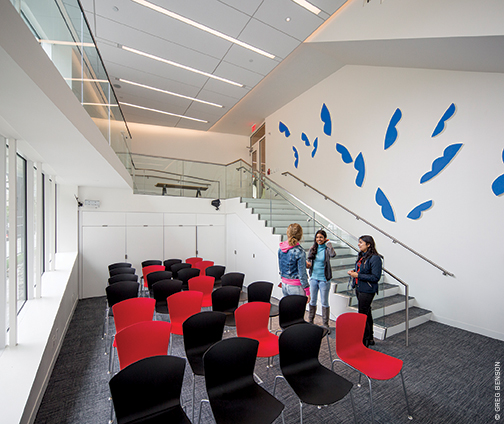
Demography, Democracy, and Geopolitical Destiny
Another panel discussion zeroed in on global migration and refugee flows. Nidal Betare, a Palestinian who was born and raised in the Yarmouk refugee camp in Damascus, Syria, spoke movingly about the Syrian refugee crisis—and pointed out that European and US reluctance to tackle it directly has underappreciated geopolitical ramifications. “In the last five years, Turkey has tried to convince Europeans and the US to create or establish a safe zone area for refugees. This would stop refugees flowing from Syria to Europe. But no one listened to Turkey,” which is now hosting upwards of 3 million refugees, the vast majority from Syria.
“Turkey has taken a very hard decision and very strong decision to resolve these problems. But the price is very high,” Betare said. “Turkey is occupying northern Syria in order to create a safe zone—that will [also] kill the dream of Kurds for having a Kurdish state in northern Syria.”
Panelists lamented the tendency of Western politicians to frame refugee flows primarily as a threat to Europe, which is understandable but obscures the fact that the vast majority of them have landed in Middle Eastern states already teetering on the brink of political instability. Eric Schwartz, a former assistant secretary of state for population, refugees, and migration who is now dean of the University of Minnesota’s Humphrey School of Public Affairs, worried about the inflammatory spillover of anti-refugee rhetoric.
“When political leaders are prepared to make attacks on the rights of minorities, and prepared to impose restrictions on minorities in the political system—when they’re promoting the perception of us and the other within populations that are part of the domestic constituency, there’s tolerance for acts of vigilantism and violence,” he said. “You absolutely see signs of that going on in the Western world today. That’s extremely troubling, because that does reflect an erosion of democracy.”
The Islamic World
It also represents a blown opportunity to foster much-needed reform within Islam, argued Maajid Nawaz in a subsequent panel on the role of religion in global politics. Nawaz is a former member of the radical Islamist group Hizb ut-Tahrir who has become a prominent critic of Islamist ideology.
“Islam today is playing a disproportionate role in encouraging intolerance between and within communities,” he said. “But it can encourage tolerance,” he added, and Muslim communities in the West have a catalytic role to play.
“Part of that reform of Islam today could be and should be in fact led by Muslims who have come to appreciate secular liberal democracies … Muslims in the West realize the importance of secularism—the importance of protecting the rights of minorities—because they are living as minorities. And if we can somehow translate that experience through the discourse about globalization to Muslims in Muslim-majority countries—through that human-to-human, Muslim-to-Muslim diplomacy—we can begin to spread the message that secularism and minorities’ rights are not against Islam, but rather are also, in the Western context, in our favor.”
“We’re maybe three percent of the United Kingdom—but that three percent needs protection as a minority,” he elaborated. “Well Egypt has, depending on who you ask, about 15 or 20 percent Coptic Christian.” So Western Muslims could play a critical role in selling their coreligionists in such countries on the value of a “more secular approach” to safeguarding religious practice and communities.
“No democracy is complete simply if it has majority rule, and that [majority] wins an election,” Nawaz said. “Intrinsic to democracies are concerns for individual liberty, the expression and freedom of and from religion. And by definition, therefore, protecting minorities within our own countries.”
In conversation with Penn President Amy Gutmann, Robert Gates delved deeper into the national-security dimensions of that dynamic.
“I think we are in the process of dismantling the caliphate,” said Gates, who became the first secretary of defense to serve under two presidents of different parties when Obama renewed his appointment in 2008. “When you look at the platforms of the two candidates, they’re basically calling for a policy that’s very similar to what the president is doing, but maybe with, as I put it, more starch and ideological fervor. So I think ISIS will eventually be destroyed as a caliphate. But I think part of the problem I have with government is the difficulty it has in thinking two or three moves out.
“The Sunni cities that have been liberated are in ruins, and there is no money, no plan, and no will in Baghdad to rebuild them,” he continued. “So what happens to that whole part of Iraq? The Kurds clearly have occupied territories that didn’t belong to them before. And how is the Baghdad government going to deal with the Kurds? So I think we are going to face second-order consequences from conflict against ISIS that will be very challenging. In terms of terrorism, the problem is that as the end approaches, I think the members of ISIS will dissipate into the general population, so we are still going to have a continuing, major problem emanating from the Middle East in terms of terrorism.
“We have, I think, less of a problem in this country than the Europeans do,” he added, “mainly because many Muslims are much better integrated in American society and are much more willing to cooperate with law enforcement or report radical imams or radicalization efforts and things like that. And frankly, that integration is central to our national security, in my view.”
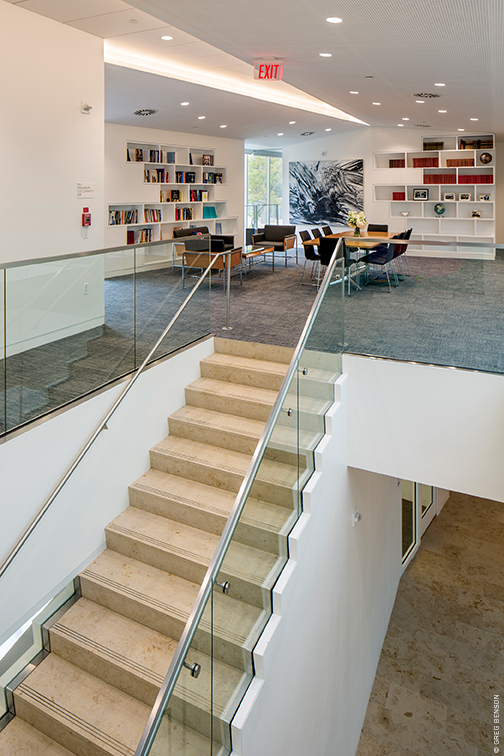
Grand Strategy in a Global Era
A panel convened after Gates and Gutmann’s dialogue surveyed geopolitical strategy, jousting over the question of how the next US president should order his or her foreign-policy priorities. Jon Huntsman and Kurt Campbell analyzed (and psychoanalyzed) Chinese President Xi Jinping in intricate detail, painting him as a “risk-taker” whose global impact will be shaped significantly, as Huntsman explained, by China’s internal political cycle leading up to the 19th National Congress of the Communist Party in 2017, as well as the shakeout of Xi’s wide-ranging anti-corruption campaign, which has indicted some 100,000 people, including more than 100 high-ranking officials who have been expelled from their posts and the party.
“I think this Chinese leadership is prepared to test the United States in ways that perhaps previous administrations had not been determined to do,” Campbell said, naming the South China Sea as a potential flashpoint. “About 40 percent of global commerce, by tonnage and by value, passes through this area every year. And the Chinese essential position is: Look, this is our territory. And that really does not in any way comport with the law at sea … That is antithetical to everything the United States has stood for for hundreds of years. So that is an area where we can have some challenge.”
Bush-era Homeland Security Advisor Frances Townsend and Obama-era State Department Director of Policy Planning Anne-Marie Slaughter focused on Syria, whose tragedy has been compounded by the re-emergence of Russian ambitions in the Middle East. Slaughter called for the next president to show “more muscular leadership” than Obama, who “has made very clear that he didn’t want any part [of] actually being willing to lead a coalition. So we have Saudi Arabia, we have Qatar, we have other states that are increasingly now talking to Russia—[including] Turkey talking to Russia.” At this stage, she said, the best a new president could hope for is a “fragile stalemate peace” on the order of the Dayton Accords that ended the war in Bosnia (but have not brought prosperity or political stability, as a provocative referendum held this September by Bosnian Serbs underlined).
Townsend argued that all signs point to Vladimir Putin’s readiness to see how far he can push a new US president. “I think you’ve got to worry about Latvia, Lithuania,” she said. “I think that the Baltics are at real risk here to be a test case for the new president.”
“And let’s not forget that the testing that takes place by Putin of a new president will be interpreted in Beijing,” Huntsman added. “They’ll learn something from it, and that will inform how they go forward in the South China Sea, or vis-à-vis North Korea, or vis-à-vis Taiwan, where you’ve got a new administration that is moving toward greater ‘Taiwanization.’”
Taking in these varied analyses of global trouble spots, Kurt Campbell offered a counter-perspective that echoed perhaps the most widely voiced concern over the course of the Perry World House’s wide-ranging colloquies.
“I think the reality is that [for] the president who comes to power, the biggest challenges on the global stage are not Syria, they’re not about China—they’re questions that we have triggered ourselves about the United States. And I think if people don’t understand that, we would leave the audience with a serious misunderstanding. When you travel through Asia, and you ask Asians what are they really concerned about, they say, ‘Well, obviously we’re worried about North Korea; we’re worried about a China that is much more proactive, provocative in some circumstances, a China that no longer is content to sit back, but wants a larger role on the international stage and is prepared to push the United States harder.’ But the biggest issue for Asians—and I would say the same thing is true in Europe and elsewhere—is about the United States.
“The fundamental issues that the United States has contributed to the world over the last 40 years are in play now,” he continued. “Are we still committed to our alliances? Are we committed to a nonproliferation regime? Are we committed to trade? Are we committed to defense in the way we have been in the past? And when I really talk to Asians and others about the world, what really has them on edge is the United States, that we’re in the process of reevaluating some of the fundamental things that have made the United States the United States for the last 40 or 50 years.”
War, Peace, and Human Rights
The keynote address of the grand opening was given by former UN Commissioner for Human Rights Navi Pillay. In a stirring speech, Pillay—a child of apartheid South Africa whose life illustrates the power of international collective action guided by human rights—delivered what amounted to an impassioned plea for full great-power participation in the institutions responsible for carrying it out, and a direct charge to Perry World House on how to advance that mission.
“State sovereignty is often invoked to deflect United Nations action to prevent serious human rights violations. I found this on a daily basis: the resistance to advancing human rights protections on the argument that this is an internal matter, a sovereign issue,” Pillay recalled.
Lauding the achievements of the International Criminal Court, which since its establishment in 2002 has acted as a critical protector of ordinary citizens against war crimes and other abuses in countries including Uganda, Mali, and the Democratic Republic of Congo—all of whose governments voluntarily subjected themselves to the ICC’s jurisdiction—Pillay lamented the ICC’s limited scope thus far.
“There is a profound anger and resentment by people, especially in Africa, against what they see as selective justice and double standards, stemming from the failure by the International Criminal Court to investigate serious crimes such as the attacks on Iraq, Crimea, and Israeli Defense Force violations in the OPT [Occupied Palestinian Territories], as well as the failure of major countries, including … the United States, Russia, and China, to subject themselves to the jurisdiction of the ICC.” That fuels a growing perception that the ICC is just a tool of colonial domination, she observed—which, insofar as it weakens popular support for the ICC among member nations, empowers abusive leaders who are eager to rule with impunity.
She observed that the violence now raging in Syria and elsewhere “hammer home the full cost of the failure of the international community to prevent conflict,” especially since “none of these crises erupted without warning.”
“They built over years of human rights grievances,” she said, “deficient or corrupt governance, and lack of independent judicial and law enforcement institutions, discrimination and exclusion, inequities in development, exploitation and denial of economic and social rights and oppression of civil society and public freedoms. This is the importance of having Perry World House—to focus on these alerts to harmful situations.
“Human rights are always central to conflict prevention, because patterns of violations, including sexual violence, provide early alerts to escalation,” she emphasized. “This truth has never been so clear as it is today. Perry World House is well placed, through global engagement and through your research, to play a significant role in identifying gaps in protection, developing a roadmap of strategies to resolve disputes, and elicit good practices that address both proximate triggers and root causes of conflict.”
A tall order, to be sure, but one that Burke-White vocally embraced before officially throwing open Perry World House’s doors. After which—in keeping with a schedule that had already been ambitious before the formal grand opening—he had exactly two days to relax, if you can call it that, before welcoming Perry World House’s next visitor, Tsakhiagiin Elbegdorj, the president of Mongolia.


